PHUKET: The Phuket Navy League has undertaken to refurbished the Phuket Tsunami Memorial Wall of Remembrance and to maintain it all year long.
The role makes the future of the wall more certain after years of neglect and the recent confusion about whether the wall would be left standing.
Unlike other tsunami memorials on and around Phuket, the Wall of Remembrance was not planned and so doubts still remain about who actually owns the land on which it sits.
Recently, a perimeter wall was built through one end of the tsunami memorial, leading to the rebuilding of the other end to accommodate the names and flags of three nations that had lost their place on the wall.
The Phuket Navy League's decision to protect the memorial is as sure a future as the memorial can be given.
Given its position, the wall is not only a memorial to the 5400 tsunami dead from 39 countries but also a tribute to one of the most remarkable feats of forensic science.
Near the wall, scientific and police teams from dozens of countries worked under the Thai Tsunami Victim Identification unit banner to identify thousands of nameless victims.
The memorial wall began as two white particle walls that blocked visitors' view of cooled sea containers that at one stage after the tsunami held about 2000 unidentified bodies.
In temporary mortuaries behind the particle board walls, teams of forensic surgeons from all over the world examined the bodies and extracted DNA samples to help with identification.
Slowly but surely, names were given back to the vast majority of victims. Of the 5400 victims, about half were tourists and Burmese, and the other half Thai.
This Phuketwan reporter was one of the few journalists granted permission to witness the identification process up close, an experience that left an enduring respect for the men and women who brought closure to so many families around the world.
Meanwhile, relatives and the firm that repatriated the bodies designated the names of countries on both walls. Various dignitaries and grieving families left wreaths and posted photographs of loved ones on the walls.
So the memorial wall developed a special meaning and significance for families all over the world.
There was a night in 2007, if I recall correctly, when the remaining sea containers and their passengers were taken off Phuket to the then newly-built identification centre and cemetery at Bang Maruan, an hour or so's drive north. The convoy was given a Tourist Police escort.
The walls were only meant to be temporary and constantly fell into disrepair before a wonderful Thai charity - the Kusoldham Foundation - combined the two walls into one permanent wall.
The Phuket public is being invited this year to go to the community ceremony that will be held at the wall. The ceremony on December 26, seventh anniversary of the tsunami, begins at 8am and lasts until noon.
Other services are usually held around the same time at Patong and Kamala, and in Phang Nga at Nam Khem village and the site of the patrol boat that was washed two kilometres inland.
A candlelight memorial will be held with candles placed in the sand at Patong beach after nightfall at Loma Park in Patong.
For those who do not know where the Phuket Wall of Remembrance is located, it's on the Phang Nga side of the Tachatchai checkpoint.
Drive through the checkpoint and where the highway swings right, head to the left-hand lane.
The cemetery is a few hundred metres along, with a new wall being built to surround the Region 8 Police Centre that will occupy part of the site.
Sponsors of the memorial wall project include US Navy - USS Pinckney; Glen Defense Marine Group; Brad Kenny - US Navy League; Larry Amsden - US Navy League; Dr Sanguan Kunaporn - Rotary International District 3330 (Thailand); Dr Mario Barblan - and friends at Rotary Club of St. Moritz and Rotary District 2000 (Switzerland); Friedrich 'Sam' Fauma - Rotary Club of Patong Beach; Wolfgang Meusburger - Rotary Club of Patong Beach; Michael Cullumbine - Grump Old Men's Society.
The role makes the future of the wall more certain after years of neglect and the recent confusion about whether the wall would be left standing.
Unlike other tsunami memorials on and around Phuket, the Wall of Remembrance was not planned and so doubts still remain about who actually owns the land on which it sits.
Recently, a perimeter wall was built through one end of the tsunami memorial, leading to the rebuilding of the other end to accommodate the names and flags of three nations that had lost their place on the wall.
The Phuket Navy League's decision to protect the memorial is as sure a future as the memorial can be given.
Given its position, the wall is not only a memorial to the 5400 tsunami dead from 39 countries but also a tribute to one of the most remarkable feats of forensic science.
Near the wall, scientific and police teams from dozens of countries worked under the Thai Tsunami Victim Identification unit banner to identify thousands of nameless victims.
The memorial wall began as two white particle walls that blocked visitors' view of cooled sea containers that at one stage after the tsunami held about 2000 unidentified bodies.
In temporary mortuaries behind the particle board walls, teams of forensic surgeons from all over the world examined the bodies and extracted DNA samples to help with identification.
Slowly but surely, names were given back to the vast majority of victims. Of the 5400 victims, about half were tourists and Burmese, and the other half Thai.
This Phuketwan reporter was one of the few journalists granted permission to witness the identification process up close, an experience that left an enduring respect for the men and women who brought closure to so many families around the world.
Meanwhile, relatives and the firm that repatriated the bodies designated the names of countries on both walls. Various dignitaries and grieving families left wreaths and posted photographs of loved ones on the walls.
So the memorial wall developed a special meaning and significance for families all over the world.
There was a night in 2007, if I recall correctly, when the remaining sea containers and their passengers were taken off Phuket to the then newly-built identification centre and cemetery at Bang Maruan, an hour or so's drive north. The convoy was given a Tourist Police escort.
The walls were only meant to be temporary and constantly fell into disrepair before a wonderful Thai charity - the Kusoldham Foundation - combined the two walls into one permanent wall.
The Phuket public is being invited this year to go to the community ceremony that will be held at the wall. The ceremony on December 26, seventh anniversary of the tsunami, begins at 8am and lasts until noon.
Other services are usually held around the same time at Patong and Kamala, and in Phang Nga at Nam Khem village and the site of the patrol boat that was washed two kilometres inland.
A candlelight memorial will be held with candles placed in the sand at Patong beach after nightfall at Loma Park in Patong.
For those who do not know where the Phuket Wall of Remembrance is located, it's on the Phang Nga side of the Tachatchai checkpoint.
Drive through the checkpoint and where the highway swings right, head to the left-hand lane.
The cemetery is a few hundred metres along, with a new wall being built to surround the Region 8 Police Centre that will occupy part of the site.
Sponsors of the memorial wall project include US Navy - USS Pinckney; Glen Defense Marine Group; Brad Kenny - US Navy League; Larry Amsden - US Navy League; Dr Sanguan Kunaporn - Rotary International District 3330 (Thailand); Dr Mario Barblan - and friends at Rotary Club of St. Moritz and Rotary District 2000 (Switzerland); Friedrich 'Sam' Fauma - Rotary Club of Patong Beach; Wolfgang Meusburger - Rotary Club of Patong Beach; Michael Cullumbine - Grump Old Men's Society.

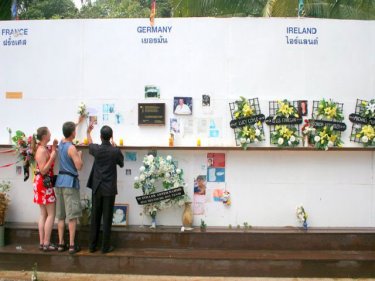
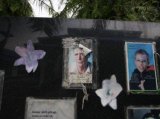
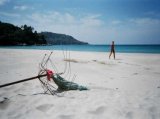
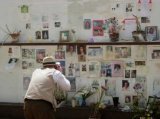
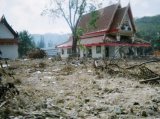
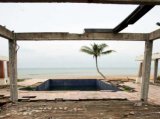
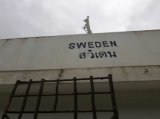
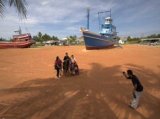
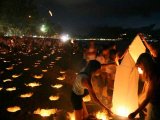
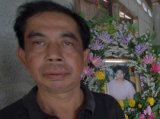



VERY GOOD ARTICLE, well done, this gives a good insight to what really happened there...
Thanks to Brad Kenny and Larry Amsden who have taken this task on and made it happen...WELL DONE GUYS...THANKS
Posted by johndev on December 24, 2011 07:19